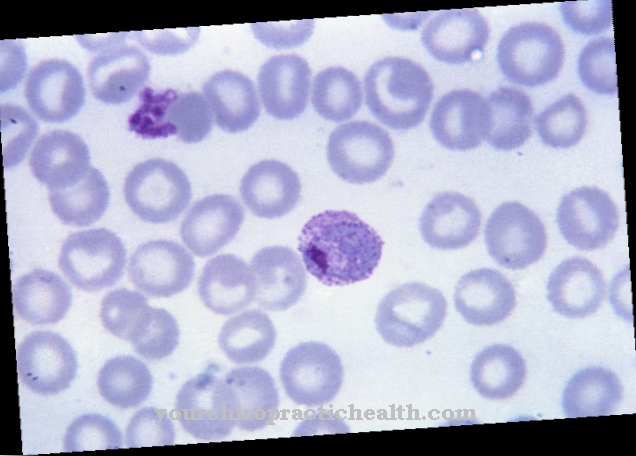In the I-syntony patients with mental illness perceive their thought patterns and behaviors as meaningful, inherent and appropriate. The ego syntony often denotes delusional illnesses and obsessive-compulsive personality disorders. The phenomenon makes diseases more difficult to treat, since those affected do not show any insight.
What is an ego syntony?

© BestForYou - stock.adobe.com
Psychology distinguishes between different compulsions and compulsive behaviors. Such patterns of deviance are either referred to as the I-syntony or the concept of Ego dysontonia connected. The ego syntony is deviant thoughts and behaviors with which the person concerned identifies. The patient does not perceive ego-syntonic deviations from the social norm as deviations, but considers them normal, correct and consistent.
A patient carries out thoughts and behaviors with ego dystonia because he has to. This means that obsessive-compulsive disorder with ego dystonia is perceived as an obsession by the person affected. Ego-dystonic patients find their own obsessive thoughts and behaviors incorrect or inconsistent. The patient himself does not experience the actions and thoughts of an obsessive-compulsive disorder with ego syntony as compulsions.
For example, patients with obsessive-compulsive personality disorders like to think that an extreme need for order is sensible and correct. Obsessive-compulsive disorder patients are usually ego-dystonic and thus usually experience the pressure of individual thoughts and impulses. Sometimes in the same patient there are patterns and thoughts with ego syntony and ego dystonia at the same time.
causes
Ultimately, ego syntony is the symptom of various psychiatric disorders. The most common associations with ego syntony are delusion and obsessive-compulsive personality disorder. Compulsive personality disorders are a group of mental illnesses.
In addition to rigidity and perfectionism, compulsive control and the compulsion to feel certain feelings of doubt or fearful caution are assigned to compulsive personality disorders. In terms of visible symptoms, an obsessive-compulsive personality disorder is very similar to obsessive-compulsive disorder. Both diseases are ultimately fundamentally different disorders of the psyche. Obsessive-compulsive disorder is characterized by predominantly ego-dystonic symptoms.
The brain metabolism is disturbed in the context of the diseases. Obsessive-compulsive personality disorders are so-called Axis II disorders with an essential ego syntony. An interplay of biological, psychological and environmental factors is suspected to be the triggering factor for compulsive personality disorders. Psychoanalysis sees strict toilet training with punishments and the resulting superego as the cause.
In cognitive therapy, individual thought processes are held responsible for maintaining the personality disorder. Due to thought processes in black and white categories, they assume that possible mistakes on their part will be severely punished. For fear of it, they behave rigid, perfectionist and inhibited. Brain damage or other psychiatric disorders are not the cause of obsessive-compulsive personality disorder.
Symptoms, ailments & signs
People with obsessive-compulsive personality disorders and ego syntony place work and the pursuit of success above pleasure and at the same time above social relationships. Based on the ego syntony, they justify this behavior in a logically rational way.Often they show no tolerance for emotional behavior. You are undecided and like to postpone decisions.
This also manifests their exaggerated fear of their own mistakes. Because of this fear, they do not even complete certain projects. Even so, they usually behave extremely conscientiously and tend to become moral apostles. Not only do they take their own behaviors extremely carefully, but the behaviors of others as well. They experience authority figures and their criticism as excessively hurtful.
Symptoms of other obsessive-compulsive disorders are often present at the same time. People with obsessive-compulsive personality disorder appear rational and cool to their social environment. They show little tolerance towards any habits and peculiarities of their fellow human beings. They are true to their own principles and norms and demand this loyalty from other people as well.
You are extremely concerned with rules and details and are inflexible in thinking and acting. Ultimately, your life seems frozen and lacks any dynamism. Those affected perceive all these behaviors as appropriate, correct and part of themselves in the case of the ego syntony. In the case of delusions, too, the subjective certainty of one's own delusions is in the foreground for the ego syntony.
Diagnosis & course of disease
A professional will make a diagnosis of obsessive-compulsive personality disorder or any other disorder with ego syntony. The psychotherapist or psychiatrist makes the diagnosis according to ICD-10. Four of the eighth typical characteristics must be understandable in the person affected, such as exaggerated fear, caution, rigidity, perfectionism and a lack of tolerance for the habits of others.
The prognosis for people with ego-syntonic personality disorders is rather unfavorable because the person concerned does not perceive his disorder as compulsive and rather perceives it as a compelling part of his personality. For the diagnosis of any kind of ego syntony, proof of the certainty of correctness must be provided. Sometimes the initial ego syntony is lost when diseases become chronic. Ultimately, however, I-syntony stands for difficult treatability.
Complications
With the ego syntony there can be not only physical, but also physical complaints and limitations. In most cases, complications arise mainly when treatment cannot take place due to the patient's lack of insight. It not infrequently leads to social exclusion and the person concerned withdraws completely from social life.
This leads to relatively severe depression and other mental illnesses. There is also a great fear of making mistakes, so that panic attacks or sweating can occur in many simple situations. These complaints can extremely restrict the everyday life of the person affected and reduce the quality of life.
Due to the ego syntony, friends and acquaintances often turn away from the person concerned because they cannot understand the behavior. There are usually no complications in the treatment of ego syntony. However, it can take a long time for the patient to admit the disease and consent to therapy. In severe cases, treatment in a closed clinic may be necessary. Life expectancy is usually not influenced by the ego syntony.
When should you go to the doctor?
Anyone who notices signs of ego syntony in themselves or in another person should always consult a doctor. Since the disease is often not noticed by those affected, friends and relatives must watch out for any warning signs. If a person who is already suffering from a mental illness shows symptoms of ego syntony, medical advice must be sought. The medical professional can first perform a physical exam and rule out physical causes.
If there is a concrete suspicion of an ego syntony, a psychiatrist or psychotherapist must be called in, who can make the diagnosis and, if necessary, initiate drug treatment. People with a personality disorder or other mental illness are particularly prone to developing ego syntony. Hormonal disorders and neurological diseases are also possible triggers. Anyone who belongs to these risk groups should consult a doctor at the typical warning signs. At the latest when friends and relatives point out behavioral problems, the help of a doctor and a therapist is necessary.
Doctors & therapists in your area
Treatment & Therapy
The treatment of patients with ego-syntonic disorders of the psyche is much more difficult than the treatment of ego-dystonic patients. In patients with symptomatic ego dystonia, there is often a subjectively higher level of suffering compared to ego syntonia. An insight into one's own illness and the desire for a cure are more likely to be achieved.
Usually, cognitive behavioral therapy is used to treat disorders with ego syntony. Cognitive behavioral therapy focuses on cognition and its processes. The attitudes, the individual thoughts, the evaluations and the convictions of the person concerned are thereby in focus. In addition to raising awareness of the cognitions, the therapy ideally involves checking the cognitions and assessing them for their appropriateness.
Irrational attitudes should be recognized and corrected in this way. Patients learn to actively shape their perception process. The subjective view of things decides the behavior and the emotional state. By correcting one's own perspective, reactions to the environment can be changed permanently. Compulsive acts can be stopped, for example, by changing the thought that caused them.
You can find your medication here
➔ Drugs for personality disordersOutlook & forecast
The prognosis for an ego syntony is usually unfavorable. It depends on the underlying disease, the overall diagnosis and the patient's understanding of the disease. If the ego syntony occurs as a symptom of a schizophrenic or other mental disorder, for example, there is a good treatment option, depending on the form of schizophrenia. Comprehensive therapy can alleviate the symptoms. However, lifelong medical supervision and medication are necessary so that the symptoms do not relapse.
People who suffer from an ego-syntonic personality disorder show in most cases no insight into the disease. This is part of the characteristics of the disease. The lack of awareness of a psychological irregularity means that they therefore typically do not seek adequate treatment. The offer of therapy is either not used at all or terminated prematurely due to their own decision-making power. This leads to an unfavorable prognosis.
If there is insight into the disease, there is a good chance that the existing symptoms will be alleviated. A change can be achieved in an extensive treatment and therapy plan as soon as the patient shows willingness to cooperate. The healing path spans several years and is associated with a processing of experienced events as well as a restructuring of the way of life. If the therapy is discontinued, an immediate relapse of the symptoms is to be expected.
prevention
I-syntony is only a symptom of higher-level diseases. This means that the phenomenon can only be prevented to the extent that causal illnesses such as compulsive or narcissistic personality disorder and delusional illness can be prevented.
Aftercare
In most cases, there are no special follow-up measures available to those affected with an ego syntony. The person concerned is primarily dependent on a quick and above all on early diagnosis of the disease so that no further complications or complaints arise.
A psychologist should therefore be contacted as soon as the first symptoms and signs of the ego syntony appear, and in many cases relatives and outsiders should draw attention to the symptoms of the disease. The patients are dependent on comprehensive psychological treatment, which in serious cases must take place in a closed clinic.
The support and care of the person affected by their own family or friends and acquaintances has a very positive effect on the further course of the disease. Intensive and loving discussions are often necessary. The ego syntony can also be treated by taking various medications. The person concerned should always pay attention to regular intake and the correct dosage. Consult a doctor first if anything is unclear or if there are side effects. The ego syntony usually does not reduce the life expectancy of the person concerned.
You can do that yourself
The ego syntony cannot be treated on its own by the person concerned. Due to the clinical picture, he does not experience suffering, nor will he see that he has to change something in his situation. In any case, therefore, psychotherapeutic help is to be provided that addresses the existing mental illness and the ego syntony.
A combination of psychotherapy and self-help can only succeed when the person concerned realizes that their behavior is abnormal. This includes, for example, visiting self-help groups, but it can also mean reflecting on one's own actions and thoughts. A diary or a conversation with people around you can help. The point is that the person concerned learns, in addition to therapy, to assess his actions and thus also recognize his behavior so that he is then accessible for behavioral therapy.
So that the person concerned learns to adapt his perception process so that he better recognizes his irrational behavior, it is important that he communicates with his environment. This should therefore also be addressed in a reflective way. It is to be classified as questionable if the environment tries to convince the person concerned of his irrational behavior, even if he does not feel it that way yet. This is the most likely to result in tensions that can lead to incomprehension, isolation, aggression or aggression.

.jpg)
.jpg)
.jpg)





















.jpg)


